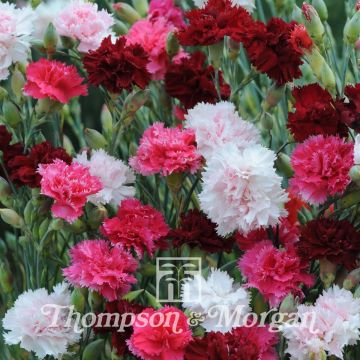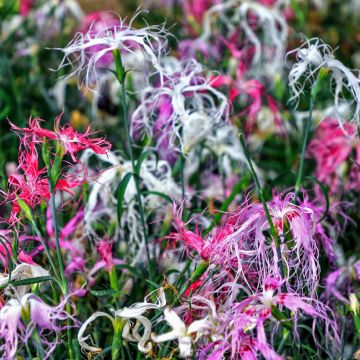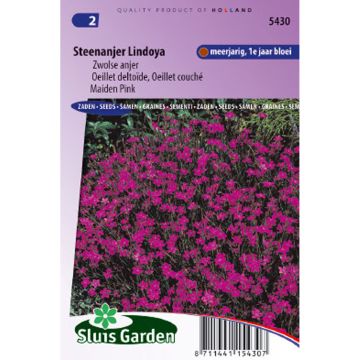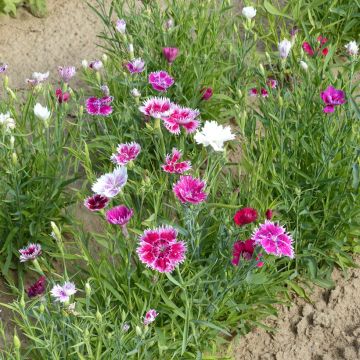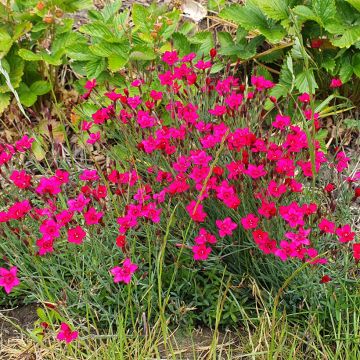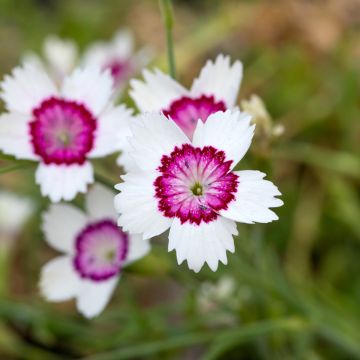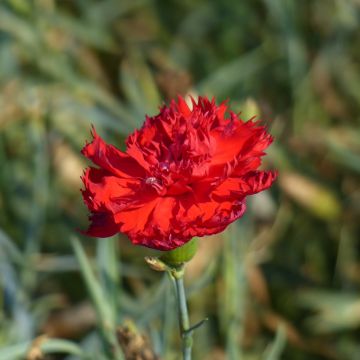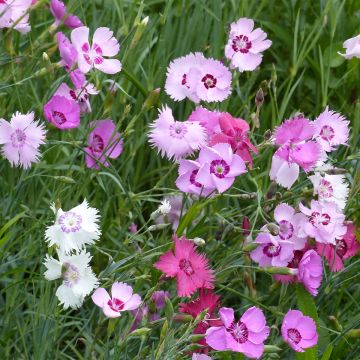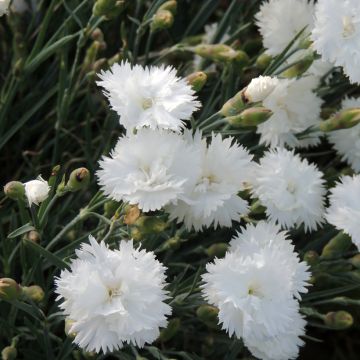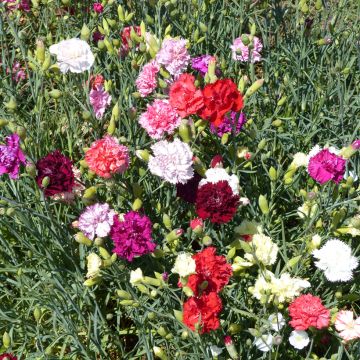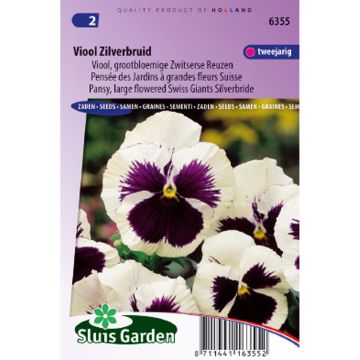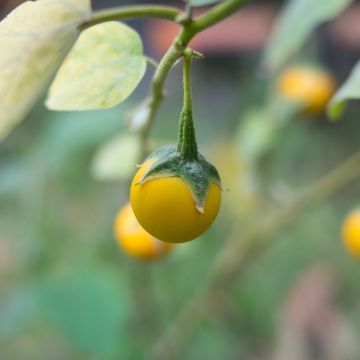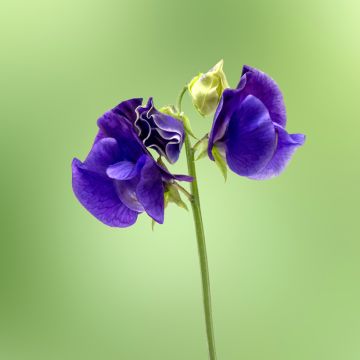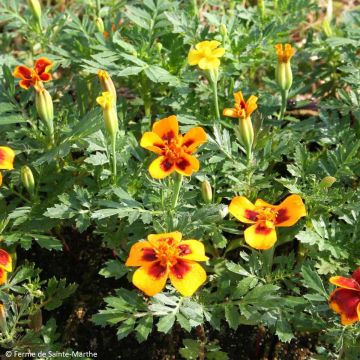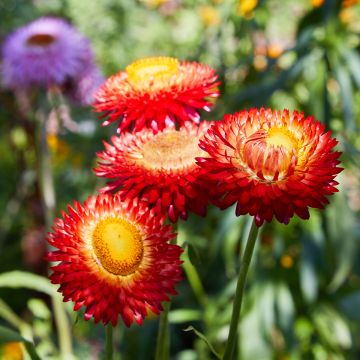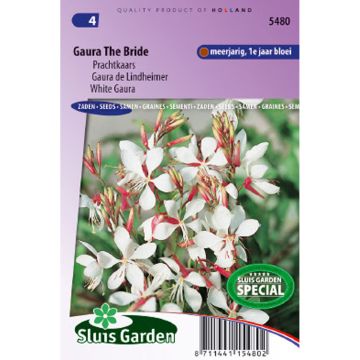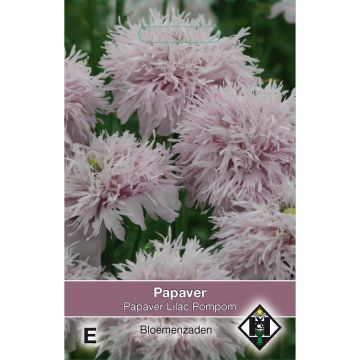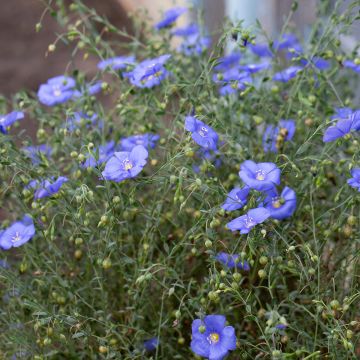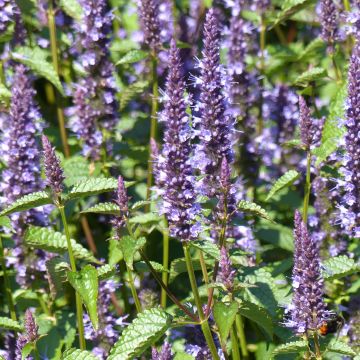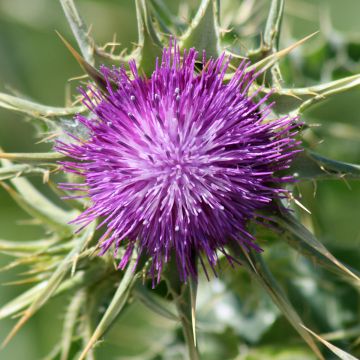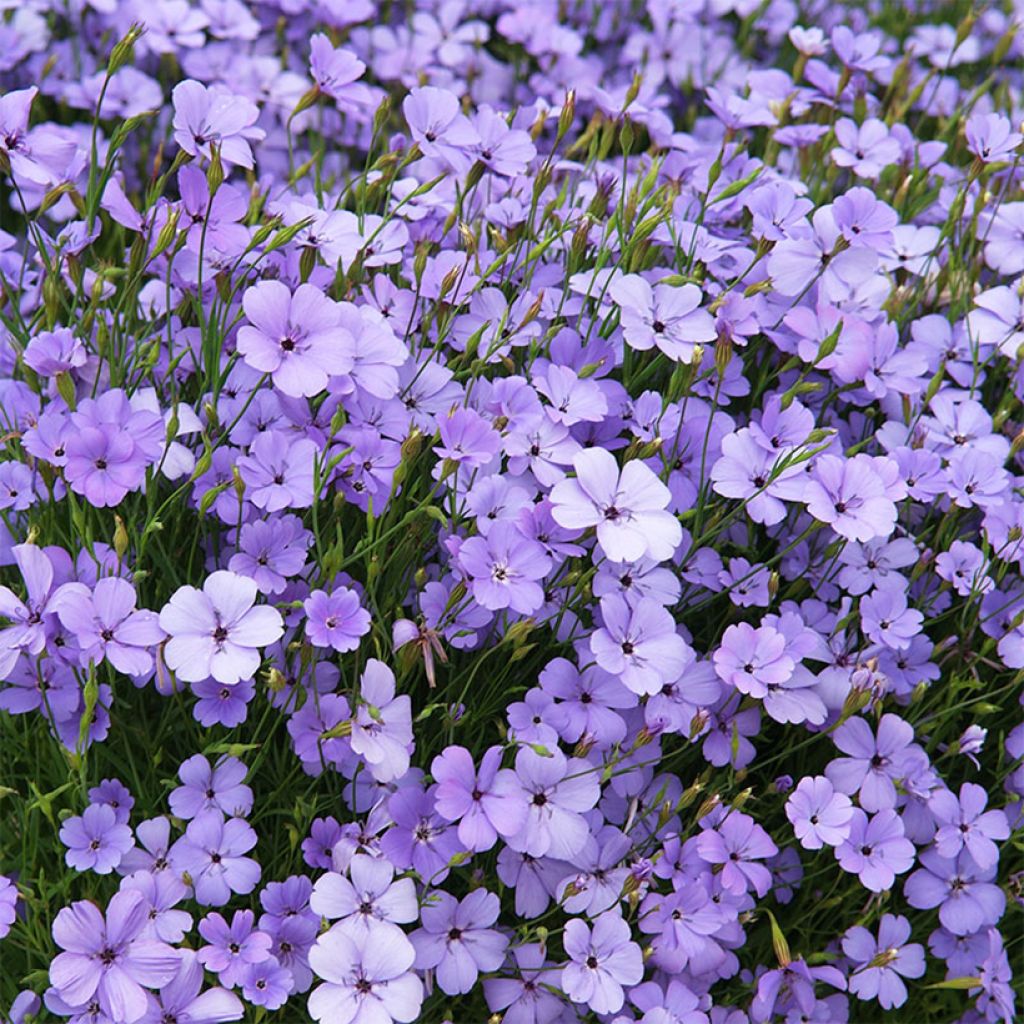

Viscaria oculata Blue Angel - seeds
Viscaria oculata Blue Angel - seeds
Viscaria oculata Blue Angel
This item cannot be shipped to the selected country
Dispatch by letter from €3.90
More information
Schedule delivery date,
and select date in basket
This plant carries a 6 months recovery warranty
More information
We guarantee the quality of our plants for a full growing cycle, and will replace at our expense any plant that fails to recover under normal climatic and planting conditions.
Seed-only orders are dispatched by sealed envelope. The delivery charge for seed-only orders is €3.90.
Does this plant fit my garden?
Set up your Plantfit profile →
Description
Viscaria oculata 'Blue Angel' is a charming small annual plant that produces hundreds of small delicate flowers in shades of blue. The whole forms a blue cloud that waves in the slightest breeze. Sow the seeds directly in place in the spring in well-drained soil and they will flower all summer in rockeries and borders. They also thrive in containers on the terrace or balcony.
Viscaria oculata (synonyms Eudianthe coeli-rosa or Agrostemma coeli-rosa) is an annual plant in the Caryophyllaceae family, related to carnations. It is found growing spontaneously in Mediterranean meadows, among grasses, especially near the coast. It prefers full sun and well-drained, sandy or clayey, but chalky soils.
'Blue Angel' is a blue selection of Viscaria oculata. The plants grow very quickly, usually taking 3 months from sowing to flowering. In regions with mild winters, Viscaria oculata can be sown in late summer to flower in spring, which is the same as in its natural environment. The mature size of these plants will not exceed 30-40 cm (12-16in) high for the flowers, with a spread of 25 cm (10in). Each forms a small, upright clump with thin stems adorned with small, slightly greyish-green leaves. Flowering occurs from March-April to August, depending on the sowing date, and lasts for about 2 months. At the top of the stems, numerous small single flowers with 5 petals open, ranging in colour from quite deep blue to pale blue with a contrasting, very dark centre. The flowers are followed by seed heads containing numerous fine seeds that can self-sow in light soil.
Plant Viscaria oculata 'Blue Angel' in an open location, in a border, rockery, or among lower-growing perennial plants. If winters are mild in your region, you can also sow them in late summer among spring bulbs and they will flower at the same time as hyacinths and daffodils. They will also be splendid on the slope of a well-drained bank, with small grasses such as Stipa tenuifolia, or at the top of a dry stone wall. These plants can fill the edges of large flower pots or containers. Before planting, in heavy or clayey soils, add a few shovelfuls of gravel and coarse sand to help drainage. Viscaria pairs well with dry land plants such as Montpellier soapwort (Saponaria ocymioides), creeping phlox (P.subulata and P.douglasii), aubrieta, candytuft, and oregano.
Report an error about the product description
Flowering
Foliage
Plant habit
Botanical data
Viscaria
oculata
Blue Angel
Caryophyllaceae
Agrostemma coeli-rosa
Mediterranean
Other Dianthus seeds
Planting and care
Sowing:
Sow Viscaria oculata Blue Angel from April to May outdoors, directly in place, for flowering in July-August. In mild climates, you can sow in September-October for flowering in early spring. Clean and prepare the soil, lighten it if necessary with compost, sand, and gravel before sowing. Sow at a depth of 3 mm (0in), in rows spaced 30 cm (12in) apart. Germination usually takes about 21 days.
When they are developed enough to be handled, thin out the seedlings, leaving a 15 cm (6in) space between each one.
Cultivation:
Plant Viscaria oculata Blue Angel in ordinary soil, preferably neutral to limestone, permeable, stony, sandy, fresh, and above all well-drained. A gravel-rich soil produces good results. This plant requires a very sunny exposure. Water in case of prolonged drought. In light soil, Viscaria oculata self-seeds abundantly if you let some fruits mature. This annual plant does not like the competition of invasive plants, which can make it disappear by casting too much shade. It is easy to naturalise, just like Damask Nigella and it adapts to the climate, benefiting from moist soil in autumn to germinate, a mild winter to grow, and spring to bloom. Further north, in cooler and more humid summer climates, it can be sown in spring and will flower in summer before disappearing.
Sowing period
Intended location
This item has not been reviewed yet - be the first to leave a review about it.
Flower seeds
Haven't found what you were looking for?
Hardiness is the lowest winter temperature a plant can endure without suffering serious damage or even dying. However, hardiness is affected by location (a sheltered area, such as a patio), protection (winter cover) and soil type (hardiness is improved by well-drained soil).

Photo Sharing Terms & Conditions
In order to encourage gardeners to interact and share their experiences, Promesse de fleurs offers various media enabling content to be uploaded onto its Site - in particular via the ‘Photo sharing’ module.
The User agrees to refrain from:
- Posting any content that is illegal, prejudicial, insulting, racist, inciteful to hatred, revisionist, contrary to public decency, that infringes on privacy or on the privacy rights of third parties, in particular the publicity rights of persons and goods, intellectual property rights, or the right to privacy.
- Submitting content on behalf of a third party;
- Impersonate the identity of a third party and/or publish any personal information about a third party;
In general, the User undertakes to refrain from any unethical behaviour.
All Content (in particular text, comments, files, images, photos, videos, creative works, etc.), which may be subject to property or intellectual property rights, image or other private rights, shall remain the property of the User, subject to the limited rights granted by the terms of the licence granted by Promesse de fleurs as stated below. Users are at liberty to publish or not to publish such Content on the Site, notably via the ‘Photo Sharing’ facility, and accept that this Content shall be made public and freely accessible, notably on the Internet.
Users further acknowledge, undertake to have ,and guarantee that they hold all necessary rights and permissions to publish such material on the Site, in particular with regard to the legislation in force pertaining to any privacy, property, intellectual property, image, or contractual rights, or rights of any other nature. By publishing such Content on the Site, Users acknowledge accepting full liability as publishers of the Content within the meaning of the law, and grant Promesse de fleurs, free of charge, an inclusive, worldwide licence for the said Content for the entire duration of its publication, including all reproduction, representation, up/downloading, displaying, performing, transmission, and storage rights.
Users also grant permission for their name to be linked to the Content and accept that this link may not always be made available.
By engaging in posting material, Users consent to their Content becoming automatically accessible on the Internet, in particular on other sites and/or blogs and/or web pages of the Promesse de fleurs site, including in particular social pages and the Promesse de fleurs catalogue.
Users may secure the removal of entrusted content free of charge by issuing a simple request via our contact form.
The flowering period indicated on our website applies to countries and regions located in USDA zone 8 (France, the United Kingdom, Ireland, the Netherlands, etc.)
It will vary according to where you live:
- In zones 9 to 10 (Italy, Spain, Greece, etc.), flowering will occur about 2 to 4 weeks earlier.
- In zones 6 to 7 (Germany, Poland, Slovenia, and lower mountainous regions), flowering will be delayed by 2 to 3 weeks.
- In zone 5 (Central Europe, Scandinavia), blooming will be delayed by 3 to 5 weeks.
In temperate climates, pruning of spring-flowering shrubs (forsythia, spireas, etc.) should be done just after flowering.
Pruning of summer-flowering shrubs (Indian Lilac, Perovskia, etc.) can be done in winter or spring.
In cold regions as well as with frost-sensitive plants, avoid pruning too early when severe frosts may still occur.
The planting period indicated on our website applies to countries and regions located in USDA zone 8 (France, United Kingdom, Ireland, Netherlands).
It will vary according to where you live:
- In Mediterranean zones (Marseille, Madrid, Milan, etc.), autumn and winter are the best planting periods.
- In continental zones (Strasbourg, Munich, Vienna, etc.), delay planting by 2 to 3 weeks in spring and bring it forward by 2 to 4 weeks in autumn.
- In mountainous regions (the Alps, Pyrenees, Carpathians, etc.), it is best to plant in late spring (May-June) or late summer (August-September).
The harvesting period indicated on our website applies to countries and regions in USDA zone 8 (France, England, Ireland, the Netherlands).
In colder areas (Scandinavia, Poland, Austria...) fruit and vegetable harvests are likely to be delayed by 3-4 weeks.
In warmer areas (Italy, Spain, Greece, etc.), harvesting will probably take place earlier, depending on weather conditions.
The sowing periods indicated on our website apply to countries and regions within USDA Zone 8 (France, UK, Ireland, Netherlands).
In colder areas (Scandinavia, Poland, Austria...), delay any outdoor sowing by 3-4 weeks, or sow under glass.
In warmer climes (Italy, Spain, Greece, etc.), bring outdoor sowing forward by a few weeks.

































